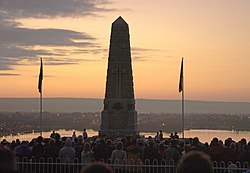ANZAC Day
Anzac Day is a day that happens once a year in Australia and New Zealand. It is celebrated by both countries on 25th April every year. It was to commemorate (honour) the members of the Australian and New Zealand Army Corps (ANZAC) who fought at Gallipoli in the Ottoman Empire during World War 1. Now though, it celebrates all "who served and died in all wars, conflicts, and peacekeeping operations" and "the contribution and suffering of all those who have served."[1][2]
| Anzac Day | |
|---|---|
 Anzac Day Dawn Service at Kings Park, Western Australia, 25 April 2009, 94th anniversary | |
| Observed by | Memorial services, memorial parades, public holiday |
| Type | Commemorative, patriotic, historic |
| Significance | First landing of the Anzacs at Gallipoli |
| Date | 25 April |
| Observances | Military parades, remembrance services |
| Related to | Remembrance Day (Commonwealth of Nations), Armistice Day, Veterans Day |
Anzac Day is also observed in the Cook Islands, Niue, Pitcairn, and Tonga. In the past, it was a national holiday in Papua New Guinea or Samoa.
ANZAC Day Media
The remembrance poppy is an artificial flower that has been used since 1921 to commemorate war dead.
- WGNT Cenotaph 07 ANZAC.jpg
Flags on the cenotaph in Wellington for the 2007 Dawn March. From left to right, the flags of New Zealand, the United Kingdom and Australia.
- First Anzac Day in Sydney, 1916.jpg
First Anzac Day parade in Sydney, along Macquarie Street, 25 April 1916
- ANZAC Day at Manly, 1922.jpg
Anzac Day at Manly, Queensland, 1922
- Anzac Day 2008 Wagga 19.jpg
A large commemoration march in Wagga Wagga, New South Wales (April 2008)
- Hobart Cenotaph, Tasmania, Australia - with wreaths for ANZAC Day.jpg
Hobart Cenotaph, Tasmania, Australia – with wreaths for ANZAC Day
- Anzacday08-1-.JPG
The wreath-laying at the 2008 dawn service at the Australian War Memorial at Hyde Park Corner, London
- 2013-04-25 AWM Anzac Dawn - Ben Roberts-Smith VC.jpg
Australian War Memorial Anzac Day dawn service, 25 April 2013. The crowd of around 35,000 people is addressed by Corporal Ben Roberts-Smith who is reading stories and anecdotes from Australian service men and women relating to the war in Afghanistan.
- Anzac1.JPG
The Last Post is played at an Anzac Day ceremony in Port Melbourne, Victoria, 25 April 2005. Ceremonies like this are held in virtually every suburb and town in Australia and New Zealand on Anzac Day each year.
References
- ↑ "ANZAC Day". Australian War Memorial. Archived from the original on 8 March 2005. Retrieved 22 April 2011.
- ↑ "Anzac Day Today". Anzac.govt.nz. New Zealand Ministry for Culture and Heritage. Archived from the original on 27 April 2011. Retrieved 22 April 2011.